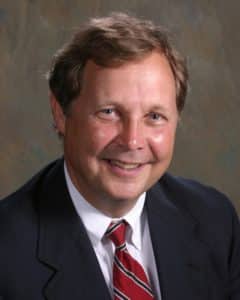
Dr. Arlo Weltge
Houston Recovery Center board member Dr. Arlo Weltge has been involved in emergency medicine close to 40 years. He is an emergency medicine doctor and a faculty member in the UT Medical School residency program.
Weltge says substance use affects a significant amount of patients seen in the Emergency Department and is considered common today.
“The concern regarding substance misuse is not just impairment of consciousness but addiction issues, injuries, assaults, and real issues with medical complications through continued use,” he states. “Alcohol, for example, can cause a direct change to the liver and has a toxic effect to organs.”
As a Board Member
Weltge was involved with the initial lease agreement of Houston Recovery Center, negotiations with the city, and hiring Leonard Kincaid, who he says has been a great asset to the organization.
“I had the willingness and interest to be on the Houston Recovery Center board because it fills an incredibly valuable need in Houston,” Weltge states. “In emergency medicine, we certainly deal with patients who have addiction and substance use issues. The sobering center is really a community service, because it gives the community an option to avoid going to jail.” Houston Recovery Center hopes the sobering center can be a future option for emergency medicine as a diversion partner for public intoxication.
“Houston Recovery Center has a wonderful program that is a model around the country. It really is a gem that is not appreciated in the community.” – Arlo Weltge
Part of the population Houston Recovery Center meets is the underserved, including the homeless. And those are the people served in the emergency departments, according to Weltge.
“We are working on a process to connect resources between emergency departments and Houston Recovery Center,” Weltge says. “In some cases, the patient can be diverted as an option to the sobering center. Once patients are stabilized, the Houston Recovery Center becomes a resource.”
Some individuals who are extremely impaired are not amenable to seek recovery, he states. But informing them makes recovery an option when they realize it’s something they need. The recovery process does not occur instantaneously at the time of impairment, unfortunately.
“Houston Recovery Center becomes the one single spot I can refer people to where they can begin the process of healing and recovery,” Weltge relates.
Emergency Medicine Doctors
What do emergency medicine doctors need to learn to better communicate with people with substance use disorder? Weltge says the fact that it requires a lifelong change of habit and is an ongoing process.
“It’s making individuals aware of the negative impact, not only of the physical but also social health issues, including individuals they work and interact with,” Weltge says. “No one is truly immune to substance use – it impacts them directly or indirectly.”
While Weltge isn’t able to estimate the number of people in emergency departments due to substance use, he says it’s a substantial amount, especially in public hospitals due to injuries and complications from substance use.
Value of sobering center
Part of the real value of the sobering center, according to Weltge, is providing people access to true recovery that allows them to go through the healing process. He says the idea of sobering centers is not new, but Houston Recovery Center has brought together a safe place to get sober.
“But the beautiful thing it offers is the connection to recovery resources,” Weltge states. “Very few sobering centers in the country have that wealth of resources available.”